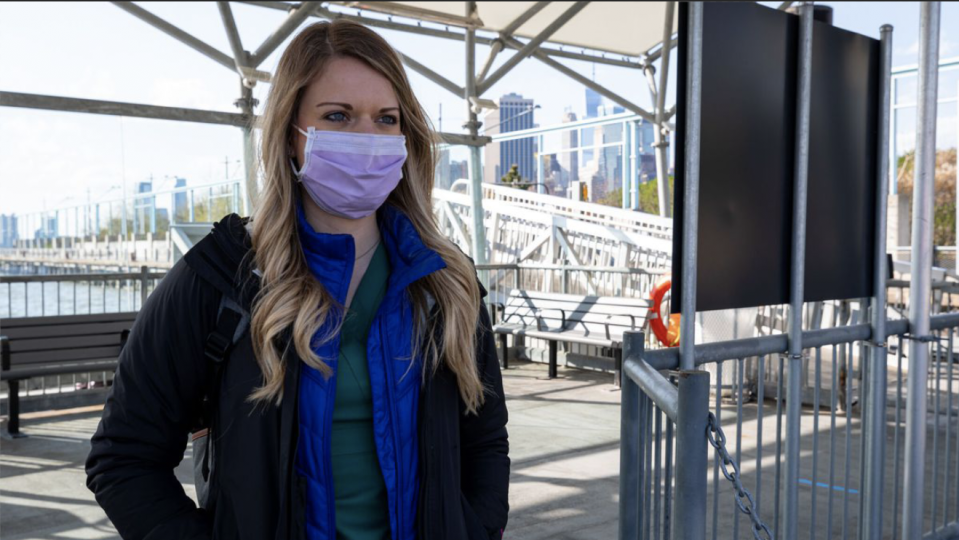Traveling nurses say conspiracies around coronavirus are 'an insult to anybody that's putting their life at risk just to provide care'
As coronavirus cases in the United States surpass 4 million, travel nurses who helped treat patients in hospitals across the country are noticing a troubling trend in their home states: friends and family who doubt the seriousness of the virus or even believe conspiracy theories about it.
“We had to wake up with fear and go to bed with fear,” said Olumide Peter Kolade, a nurse who spent over three months treating patients in New York City. “Colleagues were getting sick, it was like a war zone. It was very traumatic.”
Kolade, who was born in Nigeria and grew up in California and Texas, was living in Los Angeles at the beginning of March when he couldn’t escape the frightening news reports of overwhelmed hospitals in New York City. “I packed my bag, didn’t think about it twice.” Kolade’s 21-day contract in New York City turned into a 104-day stay, and now he fears for his home state of Texas as cases continue to increase.
“A few of my friends that I talked to in Texas would try to tell me, ‘Oh no, this is a virus-driven agenda, this is a plandemic, not a pandemic,’” Kolade tells Yahoo Life. “I just felt like it was an insult to anybody that’s putting their life at risk just to provide care for anybody out there at the hospital.”
Kolade says that for many, it will take the virus hitting close to home for the gravity of the crisis to be fully realized.
“I just felt like it was an insult to anybody that’s putting their life at risk just to provide care." Olumide Peter Kolade
ICU nurse Tom Huling shared Kolade’s sentiments. Huling, who had never visited New York City before April, traveled there from Ohio to help aid the short-staffed hospitals during the peak. “The first week in the hospital, it was like you're walking into a disaster,” Huling tells Yahoo Life. “As much as you can describe that to somebody, they're really not going to get it. You have to see people die in front of you.”
Back in his hometown of Cleveland, Huling says some friends who support coronavirus conspiracy theories claim that the virus is a “control mechanism.”
“I tell them ‘Trust me, I’m telling you this is something you should take seriously’ and not jump to conspiracy theories,” Huling says. “Nobody wins when everything’s shut down, when you have to wear a mask. Show me who's benefiting from this.”
Huling was joined in New York by travel nurse Rachel Hartley, who sailed from Virginia in April and lived on her boat while working in a Brooklyn ICU. “Seeing how my friends and family back in Virginia are responding, it's really different because they were not in the thick of it,” Hartley tells Yahoo Life.
She says that it’s been difficult seeing posts on her Facebook feed from friends supporting anti-mask groups who Hartley says seem to be taking a political stance on the virus. “To an extent, I can understand because the virus has been extremely politicized, unfortunately,” Hartley says. “It was still disappointing many times to see certain people saying things that I felt were counterproductive to the work that I’m doing personally – that I quit my job and turned my life upside to help do.”

Stephanie B., who declined to share her last name for privacy reasons, is a traveling oncology nurse from Tennessee who spent the last three months in North Carolina. She works with cancer patients who are undergoing chemotherapy and are at extremely high risk for complications if they contract the virus.
“We're pretty much wiping out their immune systems, so they literally have nothing to fight an infection,” she tells Yahoo Life, “A lot of our patients were more or less terrified to come into the hospital, but they didn't have an option.”
After returning to her hometown in northeastern Tennessee, Stephanie says it’s evident that a lot of people seem to doubt the need for precautions like wearing masks and social distancing. “I think people just assume that since they're not packed in tightly together that they don't have to take the same precautions.”
Stephanie says that she has cancer patients who are single mothers and have no choice but to go out in public to run errands. “Those are the people that I think are the highest risks that I wish that people would just take into account for when they leave the house,” she says.
Although facing individuals who deny the seriousness of the virus is a tiring task, nurses like Kolade say the most important thing is continuing to educate people and give back to your community whenever possible.
“There is no cure for this virus, at this point right now. The only way we can fight [it] is we have to collectively look out for each other,” he says.
For the latest coronavirus news and updates, follow along at https://news.yahoo.com/coronavirus. According to experts, people over 60 and those who are immunocompromised continue to be the most at risk. If you have questions, please reference the CDC’s and WHO’s resource guides.
How to maintain your physical and mental health during the pandemic
Taking care of a loved one with COVID-19? Here’s how to stay healthy
Q&A with Dr. Kavita Patel: How to keep your family safe and maintain your mental health
Read more from Yahoo Life
Want daily lifestyle and wellness news delivered to your inbox? Sign up here for Yahoo Life’s newsletter


